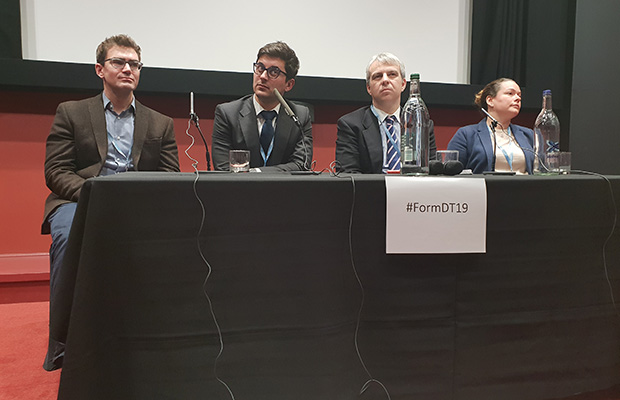On 21-22 January 2019, delegates from across academia and industry came together at SCI HQ in London for the second annual SCI Formulation Forum event on Disruptive Technologies.
Cassie Sims
The Formulation Forum event brought together a wide variety of delegates from different sectors, including those from the pharma, agrochemical and food industries. The theme of the event was 'Disruptive Technologies', highlights those ground-breaking innovations that are set to shake-up the field. These disruptive innovations ranged from the use of new computer models and taking advantage of big data, to 3D printing of pharmaceuticals.
After a welcome from the Formulation Forum Chair, Dr Malcolm Faers, Managing Director and Chairman of Arcinova, Ian Shott, gave an overview of the formulation industry and how it is interwoven with the UK Industrial Strategy and the government’s Grand Challenges. He spoke of the need for formulation scientists to integrate within these themes, encourage the growth of SMEs and increase collaboration between all stages of the supply chain.
"Formulation is not disruptive in it's own right" - Ian Shott at #FormDT19 @SCIFormulation @ArcinovaUK #Formulation pic.twitter.com/CoGqDJWDDf
— SCI💡 (@SCIupdate) January 21, 2019
The first scientific theme of the day was ‘Modelling, AI and data processing’. We were treated to talks demonstrating innovative modelling solutions, including Dr Massimo Nora’s talk on modelling complex fluids, which was not only scientifically interesting but showcased efforts to improve access to specialist computing techniques and infrastructure by a new spin-out company, Formeric. Dr Breanndan O Conchuir of IBM gave a talk on high performance computing, and Dr Jonathan Booth from Croda spoke about applying his physics background to overcome formulation problems in the cosmetics industry.
The second theme was ‘Processing technology and hardware’. Professor Harris Makatsoris demonstrated the crowdsourcing techniques they had used to formulate juice flavours, while Dr Sam Olof from Oxford spin-out company OxSyBio covered the business' 3D printing techniques for the biofabrication of artificial tissues. OxSyBio’s techniques can be used to formulate treatments for metabolic disease, and, in combination with high-throughput screening, could reduce two-and-a-half years of lab work into six weeks.
The Disrupting Technologies panel on day one, consisting of Dr David Berry (CPI), Dr Sam Olof (OxSyBio), Professor Harris Makatsoris (Cranfield University) and Dr Marijana Dragosavac (Loughborough University). Image: SCI
The day was completed with a panel discussion on overcoming the barriers faced by introducing new technologies to the market. A recurring theme was supporting cross-disciplinary communication and research, with different industries encouraged to come together to tackle similar but non-competing issues.
Four short-listed candidates also presented for the inaugural Formulation Award. Which was given to the candidate who best showed ‘Innovation in formulation and formulation science’. The winner was announced as Dr Laura Ruiz Cantu from the University of Nottingham for her work on 3D printing for personalised medicine, with the runner-up being Dr Marijana Dragosavac from Loughborough University.
Our @SCIFormulation award results are in!!🎉 congratulations to our winner @lauraruizcantu and runner up @Marijana_Drag #FormDT19 #formulation pic.twitter.com/dMG72QlKsX
— SCI💡 (@SCIupdate) January 21, 2019
The event also included a poster session. The winner of the poster prize was Rachael Xerri for her poster on Hexasomes. The runners-up were Jun Dong and Stoyan Smoukov.

